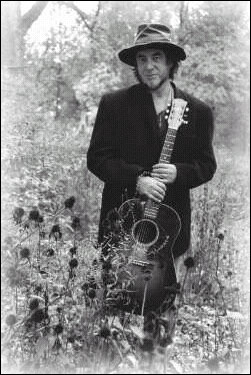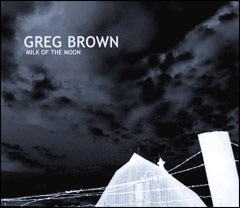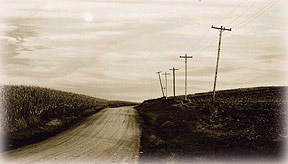|
Music Review by Lou Wigdor
Going Sleeveless and Driftless with Greg Brown |
 If
your first-time exposure to Greg Brown was at his second-set show at
Northampton’s Iron Horse in March, you might have come away with the
false impression that the 53-year old Iowan’s musical microcosm was
nothin’ but the blues. With few exceptions, Greg’s own blues and
blues-inflected compositions, like “Think about You,” “Out in the
Country,” “Speed Trap Boogie,” and the humbling “Like a Dog,”
dominated the set, which sailed steamily into the midnight hour. “I’ve
been doing a lot of blues lately, because we’re touring with Rico [Cicalo]
and his acoustic bass, which works especially well with the type of
blues that I do,” Greg explained in an interview a week after the
concert. In the twelve bar genre, Brown operates along a crossroads
where acoustic country blues exchanges low fives with an electric
guitar sound that’s been to the city, but that’s done a decisive
U-Turn back toward open spaces. If
your first-time exposure to Greg Brown was at his second-set show at
Northampton’s Iron Horse in March, you might have come away with the
false impression that the 53-year old Iowan’s musical microcosm was
nothin’ but the blues. With few exceptions, Greg’s own blues and
blues-inflected compositions, like “Think about You,” “Out in the
Country,” “Speed Trap Boogie,” and the humbling “Like a Dog,”
dominated the set, which sailed steamily into the midnight hour. “I’ve
been doing a lot of blues lately, because we’re touring with Rico [Cicalo]
and his acoustic bass, which works especially well with the type of
blues that I do,” Greg explained in an interview a week after the
concert. In the twelve bar genre, Brown operates along a crossroads
where acoustic country blues exchanges low fives with an electric
guitar sound that’s been to the city, but that’s done a decisive
U-Turn back toward open spaces.Brown’s co-conspirator in this subgenre is his accompanist, producer, and musical alter ego, Boford “Bo” Ramsey. Straight out of David Lynch-does-Iowa central casting, the wiry Iowan in leather boots and straw cowboy hat, tilted south to occlude any facial expression, gave a clinic on squeezing more out of less from an electric guitar. Standing just left of the seated, oversized Brown, Ramsey and his guitar conveyed impeccable phrasing that gave equal weight to his adroitly shaped notes and the negative space between them. No less nuanced and thoughtful, the sleeveless Brown’s acoustic guitar fingerings were assertive yet  delicate—a counterintuitive experience from such a physically imposing
man. (One of Brown’s early, enduring influences on the acoustic blues
guitar is the great Paul Geremia, from Providence.) Together, the two
Iowans made their own brand of chamber music, complementing each other
harmonically and rhythmically, and trading riffs with conversational
ingenuity.
delicate—a counterintuitive experience from such a physically imposing
man. (One of Brown’s early, enduring influences on the acoustic blues
guitar is the great Paul Geremia, from Providence.) Together, the two
Iowans made their own brand of chamber music, complementing each other
harmonically and rhythmically, and trading riffs with conversational
ingenuity.Still, the centerpiece of any Greg Brown concert is his distinctive, teluric basso. Like the man himself, its physical presence exudes an unselfconscious, primal authority. When the Iowan keeps his vibrato in check, he is one of the planet’s great blues singers. Brown consideres Big Bill Broonzy and Howlin’ Wolf as kindred vocal spirits. For this reviewer, Greg’s vocal performance evoked the deep earth tones of the great John Lee Hooker. Brown’s voice, like Hooker’s, can convey dark emotions of bitterness, despair, and the satisfaction that accompanies justice served upon transgressors of the heart. But there is a critical distinction: the Iowan is at bottom a gentle soul—a.k.a. my sweet Daddy, in the words of his daughter, Pieta, who opened the evening with her own persuasive set. For Greg Brown, explorations of the dark side resonate with a tonal subtext of positive emotions—not so much from the satisfaction that accompanies payback or revenge, but from the sheer release in testifying with the blues and marshaling their purgative powers. That, in the Iowan’s own fashion, might be his recycling of redemptive impulses, absorbed from his late father, an Open Bible and, later, Methodist minister. But the blues is one genre among many in Greg Brown’s musical smorgasbord. His latest  CD,
Milk of the Moon—his sixteenth on the Red House Label—captures
many of his eclectic interests and song writing virtuosity. The album
opens with “Lull It By,” a musical meditation/lullaby on longing and
the heart, with Greg’s basaltic, vulnerable voice overlaying his
plangent Ozarkan banjo picking. From there, the album pays whistle
stops along a crazy quilt of styles: honky-tonk country rock (“A
Little Excited”), low-down and dirty blues (“Let Me Be Your Gigolo”),
Memphis/Stax soul groove (“Steady Love”), Beefhartesque reverb rock
(“The Moon Is Nearly Full”), romantic ballads (the title tune and the
stunning “Never So Far”), and two songs—“Ashamed of Our Love” and
“Telling Stories”—that echo wisps of church hymnody, when Karen Savoca
joins Brown in strategically placed unison singing. CD,
Milk of the Moon—his sixteenth on the Red House Label—captures
many of his eclectic interests and song writing virtuosity. The album
opens with “Lull It By,” a musical meditation/lullaby on longing and
the heart, with Greg’s basaltic, vulnerable voice overlaying his
plangent Ozarkan banjo picking. From there, the album pays whistle
stops along a crazy quilt of styles: honky-tonk country rock (“A
Little Excited”), low-down and dirty blues (“Let Me Be Your Gigolo”),
Memphis/Stax soul groove (“Steady Love”), Beefhartesque reverb rock
(“The Moon Is Nearly Full”), romantic ballads (the title tune and the
stunning “Never So Far”), and two songs—“Ashamed of Our Love” and
“Telling Stories”—that echo wisps of church hymnody, when Karen Savoca
joins Brown in strategically placed unison singing.Brown saves the CD’s most striking literary moments for its final cut, “Oh You”. With cadences reminiscent of Dylan’s “Sad Eyed lady of the Lowlands” (which depicts Joan Baez), Brown sympathetically but relentlessly portrays a women with more than her share of contradictions: With your measured abandon and your farmer’s walk . . . With your pledge of allegiance and your ringless hand . . . With your young women’s terror and your old woman’s plan . . . With your heart shaped rocks and your rocky heart . . . A farmer’s walk, Brown observes, has a roll to it; he’s close to the earth, shambling along but always ready to move quickly. A young woman’s terror reflects her reluctance to take risks: she’s insecure and unwise in the ways of the world. The flip side, an old women’s plan, follows from the hard-earned fruits of experience. “This woman has great passion, but she just can’t act decisively or make a commitment,” remarked Brown. That is evident in the song’s third and eighth (final) stanzas, where descriptive portraiture cedes the stage to narrative action (ultimately the character’s inaction): Now you stand at the station and you look at the sky And the train rolled in and it went on by You had packed up your suitcase, you had saved up the fare And you don’t know why, but you’re still standing there So who is this woman? From the line, with your name that is half yes and half no, I suspected Ir/is, i.e., Iris Dement, who Brown married last November. “You think it’s Iris?” he chuckled. “Iris is nothing like that character. It’s actually a composite of four or five women that I’ve known.” Well, at least I was confident that “Oh You’s” astute wordsmithing and cadences didn’t emerge from a Brown all-nighter. “It didn’t take as long as ‘Rexroth’s Daughter’ (a highlight in his recent album, Covenant), which I agonized over for months and months, but it did need six to eight weeks of marination,” he confessed. Significantly, “Oh You” did garner kudos from one of Brown’s most valued critics, his mother. “She singled it out as her favorite on the album,” noted Brown, whose mother, a former school teacher with a passion for literature, has held an enduring influence on his writing from the beginning. Consanguinal critics aside, it is refreshing, even rare, to find such multidimensionality in a folk ballad character. Nobody on the folk music scene, in fact, embodies more eclectic, incongruous personality traits than Brown himself. A manly man of immense physicality, his passions embrace arm wrestling, spearfishing, Jack Daniels, and the creation of often beautifully crafted music, radiant with insights and vulnerability. He’s driven trucks for a living, lost part of a finger in a meat packing plant, and has a special affection for Blake, Rexroth, and Gary Snyder. He’s tasted the sophistication and squalor of cities (including New York and Las Vegas) and has more than held his own in witty, weekly banter with Garrison Keillor  on
A Prairie Home Companion. With that and more under his belt, he has
returned home humbler and wiser to a mystical-literary celebration of
his roots in Hacklebarney, just a few hills over from Turkey Scratch,
in southeast Iowa. Like all true poets, he is quick to credit the muse
that informs his writing and his music. And as his audiences well
know, he enriches one and all with his mindful insights, laying bare
his heart on his sleeveless sleeve. on
A Prairie Home Companion. With that and more under his belt, he has
returned home humbler and wiser to a mystical-literary celebration of
his roots in Hacklebarney, just a few hills over from Turkey Scratch,
in southeast Iowa. Like all true poets, he is quick to credit the muse
that informs his writing and his music. And as his audiences well
know, he enriches one and all with his mindful insights, laying bare
his heart on his sleeveless sleeve. |